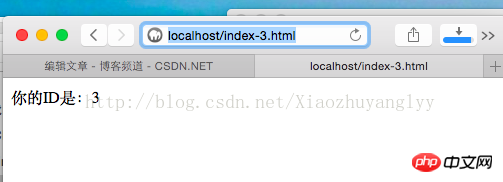
相信大部分程序员都知道php伪静态是将动态页面转变成html后缀的静态页面,事实上在服务器资源加载过程中,仍然是动态页面,只是为了让页面更加友好。具体伪静态的意义,大家可以再百度百科中查找,这里就不多赘述。
下面我们直讲述在Apache下的PHP伪静态配置方法:
1.检测Apache是否支持mod_rewrite 通过php提供的phpinfo()函数查看环境配置,通过Ctrl+F查找到“Loaded Modules”,其中列出了所有apache2handler已经开启的模块,如果里面包括“mod_rewrite”,则已经支持,不再需要继续设置。
如果没有开启“mod_rewrite”,则打开目录 您的apache安装目录“/apache/conf/” 下的 httpd.conf 文件,通过Ctrl+F查找到“LoadModule rewrite_module”,将前面的”#”号删除即可。
如果没有查找到,则到“LoadModule” 区域,在最后一行加入“LoadModule rewrite_module modules/mod_rewrite.so”(必选独占一行),然后重启apache服务器即可。
2.建立.htaccess 文件
a.方法一:最好使用vim来建立这个文件,应为这个文件是没有文件名的,操作起来不太方便。
b.方法二:新建 htaccess.txt
用记事本 打开,点击文件–另存为,在文件名窗口输入”.htaccess”,然后点击保存。此文件得保存在网站的根目录
3.让apache服务器支持.htaccess
修改httpd.conf文件
Options FollowSymLinks AllowOverride None
改为
Options FollowSymLinks AllowOverride All
4.填写网站伪静态规则 (需要 了解 正则表达式)
<IfModule mod_rewrite.c> RewriteEngine on RewriteRule index.html$ index.php RewriteRule index-([1-9]+[0-9]*).html$ index.php?p=$1//规则这边 之间的空格不能漏写, 不要写错,不然活报 Internal Server Error错误。 </IfModule>
在写伪静态规则时,应保留有价值的参数,不要将有价值的参数全部精简掉。前面例子中的 index.php?p=$1 重写为 index-p.html,(p代表传进去的数值)
5.输入格式的样子如下:
当我们输入html的形式时,出现的和输入正常php文件形式一样的页面


#Summarize :
I believe that after reading this article, everyone knows how to configure PHP pseudo-static. I hope it will be helpful to your work. !
related suggestion:
## Detailed graphic and text explanation of pseudo-static URL in php Opening of pseudo-static mode in php What is pseudo-static? What is the significance of using pseudo-static in PHP? Detailed introduction of PHP pseudo-static graphic code
The above is the detailed content of Detailed explanation of PHP pseudo-static configuration method. For more information, please follow other related articles on the PHP Chinese website!




